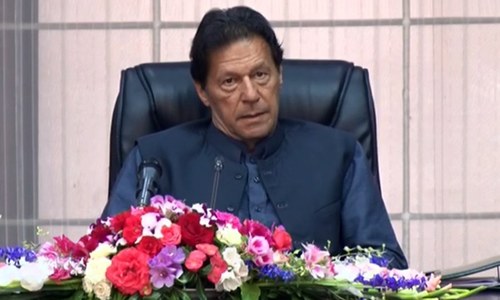ISLAMABAD: Despite a change of command and internal opposition, the government’s proposed amnesty scheme for asset declaration will go ahead without any major change and will come to an end before the International Monetary Fund’s bailout programme kicks in on July 1.
This was the crux of a special meeting on the subject presided over by new Adviser to the Prime Minister on Finance, Dr Abdul Hafeez Shaikh, here on Sunday. It was attended by Finance Secretary Mohammad Younas Dagha, Minister of State for Revenue Hammad Azhar, Federal Board of Revenue chairman Dr Jehanzeb Khan and others.
“The tenure of the amnesty scheme cannot be allowed to go beyond June 30,” a senior official told Dawn after the meeting when asked whether the business community’s demand for a longer period would be accepted or it would be made more liberal, a demand made by some leaders of the Pakistan Tehreek-i-Insaf.
“The scheme has to be concluded before the start of the IMF programme,” the official said, adding that Mr Shaikh did not suggest any change in tax rates on declaration of hidden assets.
Hafeez Shaikh wants simplification of procedure
The amnesty scheme could not be approved in two meetings of the federal cabinet last week, before the exit of then finance minister Asad Umar.
“Basically, there is no change in the scheme except that Mr Shaikh wants it to be simplified and presented to a larger group for consultations on Tuesday,” said another official.
The adviser on finance desired that it should be a people-friendly scheme, helped document the economy and brought more non-filers into the tax net instead of just generating funds. He directed the FBR to fine-tune the scheme to make it simple to understand and easy to implement, an official statement said, adding that the objective of the scheme should be to make the economy more tax-compliant and documented.
Officials said the amnesty scheme would come into force immediately to enable people to declare assets and pay taxes on them by June 30. They said the whole leadership would be required to market the scheme for complete ‘political ownership’ of the coalition partners with maximum emphasis on pushing it as a “last chance to be followed by full-scale prosecution”.
The enforcement of this slogan will be ensured through assistance of banks and the National Database and Registration Authority (Nadra) and synchronisation of their database to cover the period of undeclared assets.
The amnesty scheme has four major objectives. It will help in declaration and reporting of undisclosed assets, sales and incomes “for fresh start of a tax-compliant economy”. It will provide economic stimulus through movement of funds, reduce litigation and enhance revenues without much effort.
The scheme will cover declaration of undisclosed assets, Benami assets, sales and incomes on or before June 30, 2018, with tax rates ranging between five and 10pc with certain exceptions, but assets will be valued at prescribed rates. Foreign assets will be converted into money and remitted to rupee accounts in Pakistani banks or deposited into declarants’ own foreign currency bank accounts in the country. In the previous such schemes, the foreign assets were not required to be transferred to Pakistan.
Some of the distinguishing features of the amnesty scheme include permission for revision in balance sheets, declaration of Benami assets, sales tax and federal excise duty as well as settlement of court cases. It requires mandatory filing of tax returns and cash needs to be put in bank accounts and there will be a limit of gold declarations to a maximum of Rs5 million.
The scheme will be available to all companies and individuals, except three major categories — holders of public office since Jan 1, 2000, their spouses, children, brothers and sisters or lineal ascendant of descendants; proceeds derived from commission of a criminal offence; and cases pending before a court of law with the exception of older pending litigation.
It will allow filing and revision of sales tax returns for last completed tax period and declaring last five years’ undisclosed sales and payment of 3pc sales tax or federal excise. Another condition will be depositing the cash declared in a bank account and retaining the balance till June 30, besides withdrawal of appeals and writs in courts.
Benami assets need to be declared by paying 10pc tax, while foreign liquid assets to be repatriated into Pakistan attract 5pc tax. There will be 1pc tax on total credit entries from July 1, 2013 to June 30, 2018 or 10pc tax on peak credit entries during the same period — whichever is higher.
Likewise, there will be a 2pc tax on total credit entries in Benami bank accounts from Jan 1, 2017 till the date of issuance of ordinance or 10pc tax on peak credit entries during the same period — whichever is higher. Any other asset declaration will be subject to 7.5pc tax on the prescribed value.
The amnesty scheme 2018 announced by then prime minister Shahid Khaqan Abbasi fetched Rs124 billion in taxes from a total of 82,889 people who declared assets worth Rs2.5 trillion despite legal challenges and sunset period of the Pakistan Muslim League-Nawaz government and threats by the PTI to reverse the scheme and take action against beneficiaries.
A total of 76,960 domestic assets were declared last year, involving a total value of Rs1.460tr and tax amount of about Rs77bn. Likewise, 5,929 foreign assets worth Rs1.04tr came to the government record, contributing Rs47bn ($436 million) revenue to the national kitty.
Published in Dawn, April 22nd, 2019














































